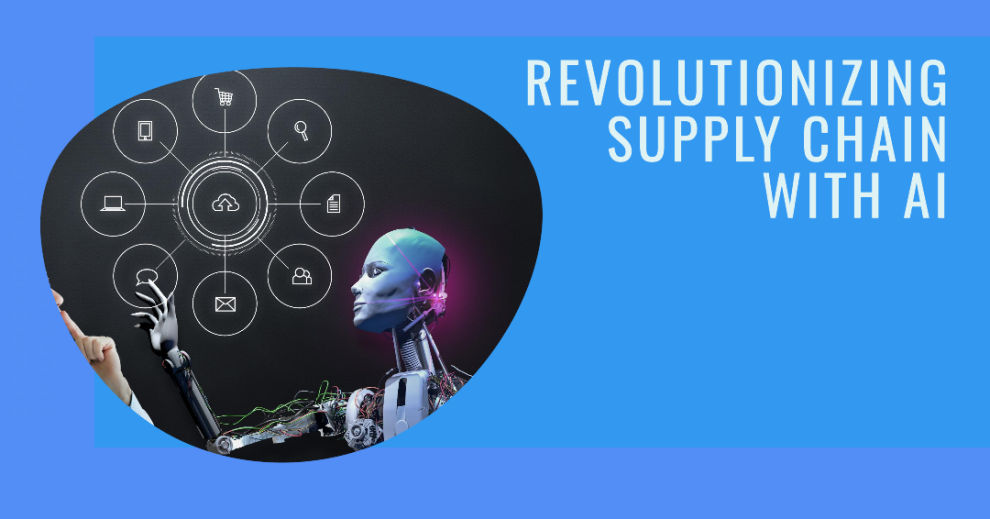The global supply chain, once a smoothly oiled machine, now resembles a precarious Jenga tower – one unpredictable event away from collapse. From natural disasters to political unrest, the world has witnessed a rapid increase in disruptions, leaving businesses scrambling to adapt and mitigate the impact.
In this turbulent landscape, a glimmer of hope emerges: Artificial Intelligence (AI). Can AI truly become the crystal ball of business, predicting and automating responses to supply chain disruptions?
The Power of Prediction
AI’s strength lies in its ability to analyze vast amounts of data, identifying patterns and relationships that escape human eyes. For supply chains, this translates to predictive analytics. AI models devour historical data on weather patterns, political climates, economic indicators, and even social media trends to anticipate potential disruptions with remarkable accuracy.
Imagine receiving an alert weeks before a hurricane could disrupt your manufacturing facility, allowing you to reroute production or secure alternative materials. This early warning system provides time to enact contingency plans, minimizing downtime.
Weather and Climate Prediction
Disruptions from extreme weather events like floods, storms, and wildfires are growing in frequency and intensity due to climate change. AI-powered forecasting taps satellites, sensors, and climate models to predict severe events globally. Combining this with location data on facilities and shipping routes allows tailored disruption predictions.
Geopolitical Hotspot Identification
Political instability, conflicts, and trade wars can severely impact supply chains. AI performs sentiment analysis on news, social media, and government data to detect rising political tensions worldwide. This allows businesses to plan for trade barriers, sanctions, unrest, and uprisings that may disrupt operations.
Early Warning of Demand Shifts
Sudden changes in consumer demand driven by economic shocks, buying trends, and seasonality take a heavy toll on supply chains. AI applies techniques like time series forecasting on historical sales data, search trends, and market indicators to predict demand fluctuations early.

Beyond Alerts: Automating Resilience
But AI doesn’t stop at mere prediction. Its true power lies in automated responses. Based on pre-defined protocols and risk assessments, AI can trigger actions in real-time, minimizing the impact of disruptions.
By combining predictive capabilities with optimization algorithms and machine learning, AI enables intelligent automation across supply chain functions. Here are a few compelling examples:
Dynamic Inventory Management
AI can automatically adjust inventory levels based on predicted demand shifts and potential disruptions, ensuring you have the right products in the right place at the right time. This prevents overstocking and stockouts, while optimizing working capital.
Route Optimization
Real-time traffic updates, combined with weather forecasts and disruption alerts, allow AI to dynamically reroute shipments, avoiding delays and reducing transportation costs. It selects the most efficient routing and mode choices as conditions change.
Supplier Diversification
AI can constantly analyze supplier performance and potential risks, suggesting diversification strategies to avoid overreliance on single sources. By detecting early signals of financial, geopolitical, climate and other troubles, it triggers automated searches for alternate suppliers globally.
Surge Pricing Management
Disruptions drive volatility in prices for transportation, commodities, and production inputs. AI taps predictive data to forecast pricing fluctuations and simulate different sourcing scenarios. It automatically implements the most cost-effective strategies.
Personalized Customer Interactions
When facing inventory shortages or order delays from disruptions, AI helps optimize customer interactions. Predictive analytics identify the highest value customers to prioritize. Customized messaging informed by purchase history and preferences minimizes attrition risks.
The Human-AI Collaboration
However, it’s crucial to remember that AI isn’t a magic bullet. Its effectiveness hinges on several factors:
Data Quality is Paramount
Garbage in, garbage out. AI models are only as good as the data they’re trained on. Ensuring high-quality, structured data is essential for accurate predictions and decisions. Prioritizing data governance should be step one for supply chain AI adoption.
Human Oversight Cannot be Replaced
While AI excels at repetitive tasks, complex decision-making still requires human judgment. Scenario evaluation, stakeholder tradeoffs, and ethics considerations involve nuanced judgment. AI should empower, not replace, human expertise.
Addressing Bias is Essential
Bias in data can lead to biased AI decisions. As supply chain data often encodes historical structural biases, care must be taken to address unfairness. Businesses must ensure responsible AI development and deployment to avoid unintended consequences.
Change Management Cannot be Overlooked
AI brings tremendous change to supply chain operations and workforce needs. Requisite reskilling and management of organizational change are key for transformation success. Workers should be actively involved in AI implementation decisions to ease adoption.
The Road Ahead
While AI-powered automation holds immense potential for navigating the unpredictable world of supply chains, it’s still evolving. Integration with existing systems, data security concerns, and the need for skilled professionals who understand both AI and supply chains are some hurdles to overcome.
The true impact of AI on the supply chain won’t be measured in its ability to predict the future, but rather in its ability to help businesses:
- Sense disruptions early
- Comprehend their implications
- Respond quickly and appropriately
- Learn continuously
This creates intelligent, dynamic, and resilient supply networks well positioned to thrive in turbulent times.
So, can AI truly automate supply chain disruptions? Not yet – but its potential is undeniable. As AI capabilities evolve, its role will only grow for bolstering supply chain resilience and adaptability amidst growing uncertainty.
















Add Comment